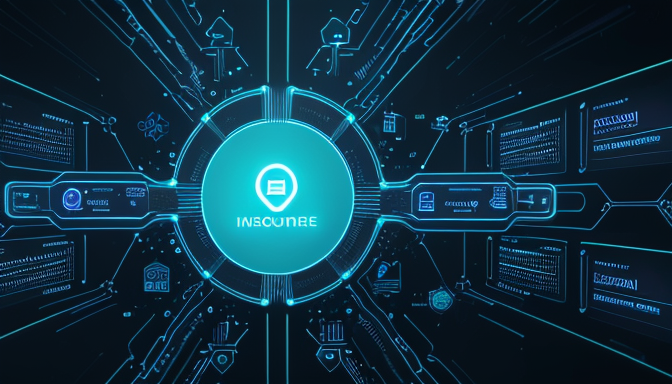Have you ever wondered how blockchain technology is more than just the backbone of cryptocurrencies? It’s true! This revolutionary tech is making waves across various industries, transforming how we interact with data and services. From financial systems to identity verification, the applications are both innovative and surprising. Imagine a world where you can track the journey of your food from farm to table, ensuring its authenticity. Or think about a system where your digital identity is secure and easily verifiable, reducing the risk of identity theft. These are just a couple of examples of how blockchain is reshaping our reality.
As we dive deeper into this fascinating universe, you’ll find that blockchain is not just a buzzword; it’s a game changer. It promises to enhance transparency, foster trust, and streamline processes across multiple sectors. Whether it’s ensuring the integrity of charitable donations or protecting intellectual property rights, the potential applications are endless. So, buckle up as we explore these lesser-known yet impactful blockchain applications that are set to revolutionize our world!
Decentralized Finance (DeFi)
Decentralized finance, or DeFi, is like a breath of fresh air in the often stagnant world of traditional finance. Imagine a financial system where you don’t need a bank to lend you money or a broker to trade stocks. Sounds revolutionary, right? With DeFi, you can engage in peer-to-peer transactions directly, cutting out the middleman. This means anyone with an internet connection can access financial services, regardless of their location or financial status.
What’s even more exciting is that DeFi fosters innovation in areas like lending, borrowing, and trading. For instance, users can lend their cryptocurrency to others and earn interest, all while maintaining complete control over their assets. It’s like being your own bank! But how does it work? DeFi platforms utilize smart contracts—self-executing contracts with the terms directly written into code. This ensures that transactions are secure, transparent, and irreversible.
Here are some key features of DeFi:
- Accessibility: Anyone can participate, making finance more inclusive.
- Transparency: All transactions are recorded on the blockchain, providing a clear audit trail.
- Innovation: New financial products are constantly emerging, catering to various needs.
In essence, DeFi is not just about replacing banks; it’s about creating a whole new ecosystem where financial freedom is the norm. So, are you ready to dive into this exciting world?
Supply Chain Transparency
Imagine a world where you can trace the journey of your favorite coffee from the farm to your cup. Blockchain technology is making this a reality by enhancing . By providing a secure and immutable ledger, blockchain allows all parties involved in the supply chain to access real-time data about the products they handle. This means that every step, from production to delivery, is documented and verifiable.
In industries like food safety, pharmaceuticals, and luxury goods, this transparency is crucial. For instance, consider a scenario where a batch of medicine is recalled due to safety concerns. With blockchain, companies can quickly track the affected products, ensuring that only those specific items are removed from shelves. This not only reduces fraud but also builds trust with consumers who can verify the authenticity of the products they purchase.
Furthermore, blockchain’s ability to create a decentralized network means that no single entity has control over the data. This democratization of information fosters collaboration among suppliers, manufacturers, and retailers, leading to a more efficient and accountable supply chain. In a nutshell, blockchain is not just a buzzword; it’s a game-changer that is reshaping how we think about transparency in supply chains.

Digital Identity Verification
is becoming increasingly crucial in our hyper-connected world. Imagine a future where you can prove who you are without the hassle of cumbersome paperwork or the fear of identity theft. Blockchain technology is paving the way for this revolution by offering a secure, decentralized method for verifying identities. This means that instead of relying on a central authority, individuals can have control over their own data.
With blockchain, the verification process is not only more secure but also faster and more efficient. For instance, when you want to access online services, instead of submitting multiple forms of identification, you can simply use your blockchain-based identity. This reduces the risk of your personal information being stolen or misused. Isn’t that a game changer?
Moreover, this technology is vital for various applications, including:
- Online Transactions: Ensures secure payments and reduces fraud.
- Voting Systems: Provides a transparent method to verify voter identities.
- Access to Services: Simplifies the process of signing up for essential services.
As we embrace this technology, the potential for enhanced security and greater accessibility in our digital lives is limitless. By leveraging blockchain for digital identity verification, we can create a safer and more trustworthy online environment for everyone.
Intellectual Property Protection
In today’s fast-paced digital world, protecting your creative ideas is more important than ever. Blockchain technology is emerging as a game-changer in the realm of intellectual property (IP) protection. Imagine having a secure, tamper-proof record of your work that is accessible to anyone, yet remains entirely yours. This is the magic of blockchain! By providing a transparent and immutable ledger, it allows artists, inventors, and businesses to easily prove ownership of their creations.
Think about it: every time you create something—be it a piece of art, a song, or a groundbreaking invention—there’s a risk of someone else claiming it as their own. With blockchain, you can register your IP in a decentralized manner, meaning that no single entity controls it. This not only simplifies the process of proving ownership but also makes it easier to license your work. As a result, creators can focus on what they do best—creating—without constantly worrying about theft.
Furthermore, the benefits extend beyond just individual creators. Businesses can leverage blockchain to protect their trademarks and patents, ensuring that their innovations remain exclusive. The transparency offered by blockchain also fosters trust among consumers, as they can verify the authenticity of products. In a world where imitation is rampant, this level of protection is invaluable.
Charitable Donations Tracking
Imagine donating to a cause you care about and being able to see exactly how your money is being spent. Blockchain technology is making this a reality by providing a transparent and immutable ledger for charitable donations. This means that every transaction is recorded and can be verified by anyone, ensuring that funds are used for their intended purpose. Isn’t that a game changer?
With blockchain, donors can track their contributions in real-time, which fosters a sense of trust and accountability. For instance, organizations can share their financial records openly, allowing you to see how much money is raised and how it is allocated. This level of transparency is especially crucial in today’s world, where skepticism about charitable organizations is rampant.
Moreover, the use of blockchain can help reduce administrative costs, allowing more funds to go directly to the cause. Charities can operate more efficiently, and as a donor, you can feel confident that your contributions are making a real impact. The following table illustrates the key benefits of blockchain in charitable donations:
| Benefit | Description |
|---|---|
| Transparency | Real-time tracking of donations ensures funds are used appropriately. |
| Accountability | Immutable records hold organizations accountable for their spending. |
| Efficiency | Lower administrative costs allow more funds to reach the intended cause. |
In conclusion, blockchain is revolutionizing how we view charitable donations, making it easier for everyone to give with confidence. So, the next time you support a charity, consider how this technology is enhancing your ability to make a difference!
Frequently Asked Questions
- What is blockchain technology?Blockchain technology is a decentralized digital ledger that records transactions across multiple computers. This ensures that the recorded transactions cannot be altered retroactively, providing security and transparency.
- How does Decentralized Finance (DeFi) work?DeFi uses blockchain to eliminate intermediaries in financial transactions, allowing users to lend, borrow, and trade directly with one another. This opens up financial services to anyone with internet access, regardless of their location.
- Can blockchain improve supply chain transparency?Absolutely! By using blockchain, companies can track products in real-time, verify their authenticity, and reduce fraud. This is especially crucial in industries like food safety and pharmaceuticals.
- How does blockchain help with digital identity verification?Blockchain provides a secure method for verifying identities by creating a decentralized and tamper-proof record. This significantly lowers the risk of identity theft and enhances the security of online transactions.
- What benefits does blockchain offer for intellectual property protection?Blockchain can record ownership and licensing of intellectual property in a transparent way, making it easier for artists and inventors to prove their rights and protect their creations.
- How does blockchain enhance charitable donations tracking?Using blockchain for donations allows donors to see exactly how their contributions are being used, fostering trust and encouraging more people to contribute to charitable causes.

